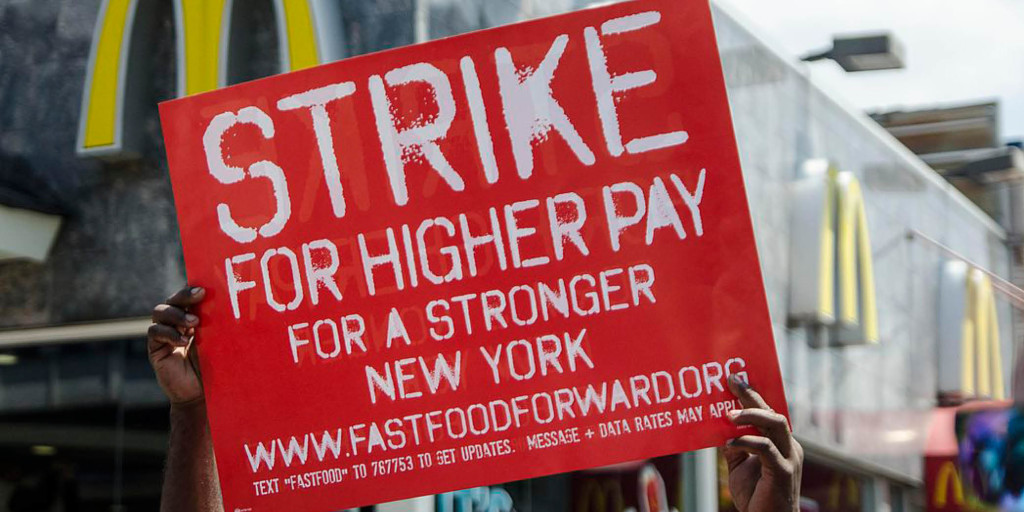Editor’s Note: This is an open letter from Prof. Howard Baetjer to a friend who commented on one of his Facebook posts about minimum wage laws.
Baetjer and his friend, Adam, look at the minimum wage issue from very different perspectives, so Baetjer wrote an open letter. What do you think about the issue? Check out Baetjer’s response to Adam and let us know what you think in the comments below.
Adam,
Here is my rejoinder to your response to my Facebook post on April 21, in which I wrote,
Minimum wage laws are immoral. Those who enact and enforce them should be punished for interfering with the rights of other people to interact with one another on mutually agreeable terms.
You are as zealously in favor of minimum wage laws as I am opposed to them. And we are both passionate because of what we believe to be their effects on people who lack the education and economic opportunities you and I enjoy. We differ, however, about the consequences of minimum wage laws on such people.
In what follows, your words are indented; mine are not:
If [a] restaurant and its patrons are not able to pay people a wage such that workers working there full time aren’t below the poverty line, then it should not exist.
Fiddlesticks. If the restaurant covers its costs, including labor costs, out of what patrons pay for the food, the restaurant is creating value. In broad economic terms, it’s a viable enterprise, so it should exist. In personal, human terms, it should exist because its owners, customers, and workers all choose to participate in or patronize it. As judged by their choices, the restaurant should exist.
You have an answer for that: the low-paid workers don’t really have a choice, or don’t have a meaningful choice. You scoff at my assertion that the workers and owners interact “on mutually agreeable terms:”
It isn’t mutually agreeable when someone is desperate enough to work multiple full time jobs in order to make ends meet. That makes a mockery of “mutually agreeable terms”. Is it mutually agreeable if someone is hungry and all they can afford is moldy meat? The seller is able to make money on something they’d otherwise throw away, while the buyer can scrape most of the mold away (sweat equity!) and take a chance on getting sick. They’re saving money over buying not moldy meat! They should feel fortunate!
This is passionate, but not pertinent. First, it disregards the meaning of “agreeable.” Surely there are desperate people who must work several low-paying jobs to make ends meet. But they do in fact agree to take those jobs. Presumably they do so because they see the job as their best available option.
Second, and crucial, it disregards the workers’ own judgments about what’s good for them: Would the workers be better off if the job were not available at all? Clearly not. To say the low-paying restaurant should not exist is to say that the workers there should not have a job opportunity they value. It is to advocate making them worse off as they see it.
Similarly for your analogy to selling a hungry person moldy meat: If someone has moldy meat to sell and the hungry person wants to buy it, we would hurt that person by refusing to sell it to him.
Your indignation at allowing companies to pay (and workers to accept) wages below “a living wage” seems based in an assumption that all employers can afford to pay higher wages. If that were true, the indignation might be justified. But it’s false. Always there are businesses that are just barely covering their costs, and they have to close if minimum wage laws force up their labor costs. When they close, their workers lose their jobs. That’s bad for those workers. Yes, minimum-wage workers who keep their jobs will enjoy higher wages when minimum wages rise, but some workers will lose their wages altogether. This is what I had in mind by saying minimum wage laws are immoral: no one has a right to deny those workers the opportunity to work.
You made the same claim about the value of low-paying jobs in an earlier post when you wrote,
If a job cannot pay enough to live on, then it’s not actually valuable enough to exist, and we’re better off encouraging businesses to create jobs where they can pay enough.What’s at stake is not “encouraging” businesses to pay more, but forbidding them to pay less. And low-wage jobs are often very valuable to the people who take them. Roughly half of minimum-wage workers are not trying to support a family, but are the second or third income-earners in a family, supplementing their families’ incomes. That’s valuable.
Of great value to many low-wage earners is the skills and experience they gain in the low-wage jobs, which help them earn more in their next jobs. Preventing businesses from offering low-wage jobs cuts off those bottom rungs of the employment ladder and denies disadvantaged people a valuable means of making themselves more valuable employees. In this way, minimum wages help cause economic distress for disadvantaged people.
Unpaid internships don’t “pay enough to live on;” they don’t pay anything. But they are very valuable to those who learn from the experience. In the same way, low-wage starting jobs are very valuable to poorly-educated kids.
I respect and share the passion of your concern for people we would both say are economically oppressed (though on different reasoning). In defending minimum wage laws, however, you are unwittingly enabling the oppressors. You emphasize the good effect minimum wage laws certainly have on some low-wage earners—to raise their wages. But you ignore the bad effect minimum wage laws have on other low-wage earners—to eliminate their wages and their opportunities to develop skills.



